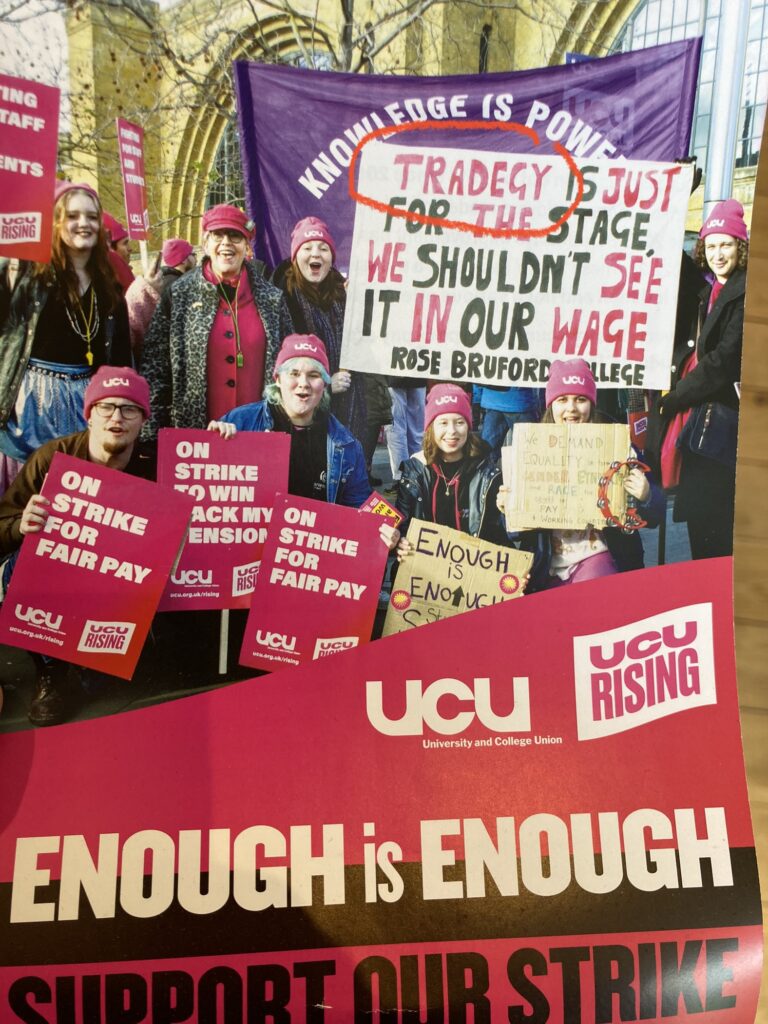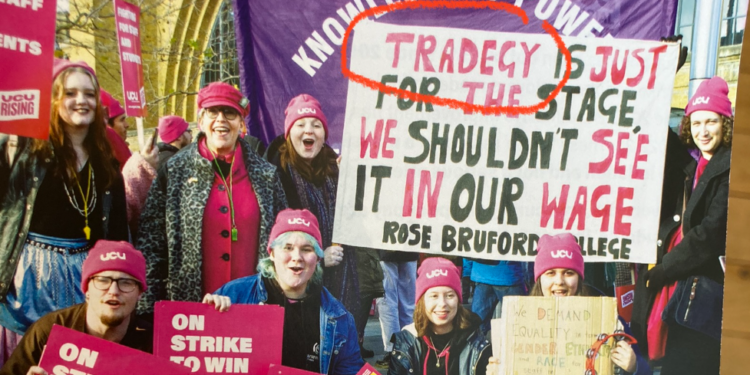Take a look at this leaflet, distributed by the University and College Union (UCU) recently as part of its ongoing phoney war with universities over, well, having the moon on a stick.

I’ve circled the relevant part in red. Yes, you’ve read it correctly – it’s not an optical illusion or trick of the light. The sign really does say what it appears to say.
Think about this for a moment. It’s bad enough, of course, that somebody purporting to be a lecturer at a university or college wouldn’t know how to spell ‘tragedy’ or would make an innocent slip of the pen when writing the word and not think to correct it. But that in itself wouldn’t be worth commenting on. What’s notable about the leaflet, rather, is the two quite startling things that had to happen in order for its cover photo to have made its way into the public domain. The first is that nobody involved in the demo said to the person holding up the banner, “You appear to have made a mistake: that’s not how you spell ‘tragedy’. So maybe you therefore shouldn’t hold that thing up in public, as it will make us look like clowns given that we are purporting to be academics who should be given a pay rise at a rate of 3% above the CPI for educating the best and brightest of the country.” And the second is that nobody at the UCU had any qualms about putting the photo on presumably hundreds of thousands of printed leaflets for public distribution. The first thing looks like shoddiness. But the second looks more like contempt: why should scholars display any basic adherence to the values of excellence or intellectual rigour? And why indeed should they care what other people think of them?
Sadly, though, this is entirely in keeping with modern academia’s attitude in the round. Readers will be probably be familiar with the University of Hull’s policy of not marking students down for bad spelling or grammar on the grounds that insisting on good English is “elitist” and (yawn) “homogenous, North European, white [and] male”. This is just one of the more egregious examples in a wider pattern, however, of practices that are designed deliberately to dumb-down university education and lower standards in the name of ‘inclusivity’, and which now permeate U.K. academia at every level – even Oxford is at it. The mood music in the profession is essentially that students go to university in order that they be treated fairly, which in itself means tailoring everything in such a way that the educational experience is moulded to every nuance of every single student’s character, abilities and background. And since aptitude, ability and education are themselves simply facets of a student’s character, then they should be treated in exactly the same way – as reasons why the individual tailoring process needs to take place. Johnny can’t help being lazy, and therefore we need to make sure that we treat him inclusively in spite of his laziness. Sarah can’t help being a bit thick and not able to spell, and therefore… and so on and so on.
The dismal truth underlying all of this – and it is a truth which is illustrated quite nicely by the UCU leaflet depicted above – is that while academics trump all of this as being “good educational practice [which] benefits all students“, the main group of people it benefits are academics themselves. When standards get lowered, you don’t have to really work very hard, teaching becomes a lot less challenging, one can present oneself as being lovely and nice and matey all the time, and one can breezily give all students wonderful marks and see them off at graduation with a warm glow and first class degrees that aren’t worth the paper they are written on. Putting into effect exacting standards is hard work – and academics, being very intelligent people, are really good at thinking up justifications, dressed in the floweriest prose, as to why hard work is a bust and comfort all round is the way to go. Why should we expect students to achieve high standards when it’s ‘good educational practice’ for them not to have to? And why should we spell words on banners correctly given that the rules of spelling are themselves simply a manifestation of the patriarchy?
The wider question, of course, is what to do about this problem, which is becoming acute. Modern academia is almost monolithically globalist and dominated by the interests of a particular Brahmin caste of upper middle class remoaners. They don’t see the education of the next generation of our country’s leaders as a priority – indeed, they would think this idea to be laughable (and, in fairness, vast swathes of them are from overseas anyway). What they are chiefly interested in is feathering their own nests, pursuing their niche research interests and convincing themselves that they are contributing to a broader mission of making the world more just, fair and so on. In this sense, it’s entirely natural for them to pooh-pooh the pursuit of excellence and scholarly rigour, and to celebrate ‘inclusivity’. How do we turn the tanker around? Christ knows; the Tories have been in power for 13 years and haven’t yet indicated they even think it’s an issue, but maybe a long period out in the cold will focus their minds a little. Fingers crossed.
Busqueros is a pseudonym.














To join in with the discussion please make a donation to The Daily Sceptic.
Profanity and abuse will be removed and may lead to a permanent ban.